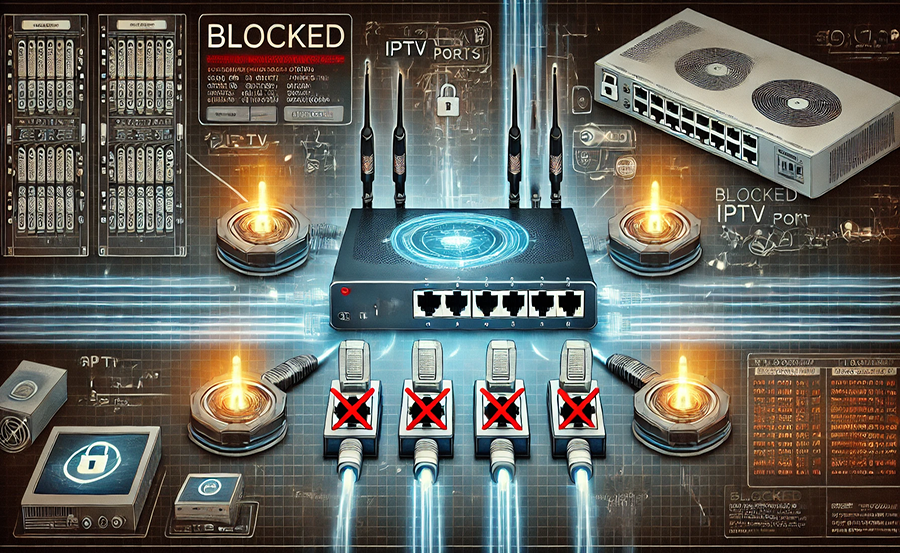Introduction to IPTV and Common Port Issues
In a world obsessed with instant streaming and diverse content, IPTV services like Rapid IPTV have soared in popularity. However, users often encounter annoying setbacks, particularly port blockages, which can spoil the viewing experience. So, whether you’re a tech novice or an IPTV veteran, tackling these obstacles quickly is imperative. Let’s embark on a journey to resolve your IPTV woes without further ado.
Understanding How IPTV Works
Before diving into solutions, it’s helpful to grasp a basic understanding of how IPTV functions. It’s not your typical cable or satellite service; instead, it streams content directly over the Internet. This means you might sometimes face issues like port blockages due to ISP restrictions or firewall settings. But fret not; each problem has a solution!
The Role of Ports in IPTV Streaming
Ports play a crucial role in the seamless streaming of IPTV services. Think of them as gateways essential for allowing data packets to travel between servers efficiently. But what happens if these ports are blocked? You guessed it right: disrupted streaming, laggy video, buffer hell—the list goes on.
Helpful Hint:
Get instant access to live TV, sports, movies, and more with Rapid IPTV Subscription the best IPTV service on the market.
Why Port Blockages Occur
Port blockages can occur for various reasons. Internet Service Providers (ISPs), often in an attempt to manage bandwidth or comply with regional content laws, might restrict specific ports used by IPTV services. Network firewalls or router settings can inadvertently block these ports too, leaving you without your favorite live TV access.
Identifying Port Blockage Symptoms
Identifying symptoms is crucial to resolving any technical issue. Knowing the signs of port blockages can help you quickly diagnose problems with your IPTV service and address them efficiently.
Common Signs of Port Blockages
- Lagging video streams
- Frequent buffering or freezing
- Access errors or inability to load channels
- Inconsistent connection quality
If any of these issues sound familiar, chances are you’re dealing with a port blockage on your IPTV stream.
Diagnostic Tools and Techniques
When suspecting port blockages, employing the right diagnostic tools and techniques makes a difference. Services like port scanners and diagnostic software can help pinpoint where the blockage exists. Sometimes, a simple traceroute via command prompt could reveal telling network inconsistencies.
Steps to Unblock IPTV Ports Effectively
Ready to tackle the problem? Follow these steps for resolutions that work. Remember, if at first you don’t succeed, tweak your approach, and try again.
Step 1: Review Your Firewall and Router Settings
Firewalls and routers are often culprits in unexpected blockages. Dive into your settings and ensure ports used by Rapid IPTV remain open. Keep your firmware updated for the latest fixes and optimizations.
Need a list of common IPTV ports? Here’s a non-exhaustive guide to get you started:
- 8080
- 7547
- 8443
- 80
Step 2: Consult Your ISP
When router tweaks don’t suffice, contacting your ISP might be necessary. Many ISPs guide users to configure their equipment better, or they might even adjust settings remotely upon request. Transparency is key, so don’t hesitate to ask specific questions about service throttling or port management.
Step 3: Avoid Legal and Illegal Pits
Why mention this? Because dabbling in unreliable services can lead to ISP persecution and related port blocks. Stick with legitimate providers like Rapid IPTV, where compliance is part of quality service.
The Superiority of Rapid IPTV
While there are multiple services, few can rival the excellence of Rapid IPTV. Whether it’s quality or reliability, the advantages are clear.
Why Choose Rapid IPTV?
Simple: it’s the best IPTV service for live TV, offering an immense array of channels at exceptional quality. Supported by a hard-working team dedicated to user satisfaction, Rapid IPTV ensures your streaming is smooth and uninterrupted.
Rapid IPTV’s Unique Features
From robust customer support to constant service improvements, Rapid IPTV stands at the forefront of IPTV technology, perfect for tech enthusiasts and non-tech users who want superior streaming experiences.
Additional Tips to Improve Your IPTV Experience
Beyond addressing port blockages, adopting a few additional measures can significantly enhance your viewing experience.
Upgrade Your Internet Speed
If your current Internet plan doesn’t cut it, consider an upgrade. Faster speeds allow higher quality streaming with reduced buffering times. Rapid IPTV’s services shine the most when combined with faster bandwidth.
Regular Device Maintenance
Devices can wear down over time, causing unexpected streaming hiccups. Regular maintenance, such as updating firmware and clearing cache, can prevent performance issues from creeping up.
A Farewell to Frustration
As we wrap our comprehensive guide, remember: resolving IPTV port blockages might require patience, but it’s very doable. With sound knowledge and tools at your disposal, the searing frustration of connectivity issues can become a distant memory. Don’t let technical hurdles deter you from enjoying the streaming splendor Rapid IPTV offers; rise up, troubleshoot, and binge-watch unabashedly!
Frequently Asked Questions

What are the typical ports used by IPTV?
IPTV often utilizes ports such as 8080, 7547, 8443, and 80. Ensure these are open on your router and firewall for optimum streaming.
Can I unblock ports without contacting my ISP?
Yes, you can alter your router’s settings and configure your network firewall yourself. If issues persist, it’s a good idea to contact your ISP for additional support.
How does Rapid IPTV differ from other services?
Rapid IPTV offers an unparalleled selection of HD channels coupled with reliable customer service. It’s considered the best IPTV service for live TV due to its consistent performance and robust features.
What’s the best internet speed for IPTV streaming?
For smooth streaming with Rapid IPTV, a minimum of 25 Mbps is recommended, especially for HD and 4K content.
How often should I update my router settings?
Updating your router’s firmware and settings every few months or as prompted by your router model’s updates is ideal for maintaining peak performance.
Setting Up IPTV on Your MAG Box: A Simple Step-by-Step Process

